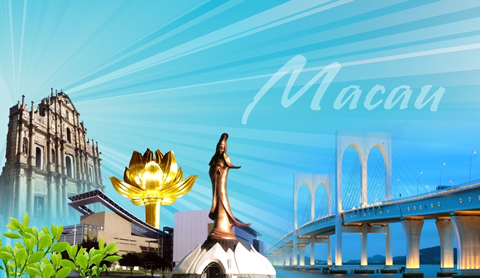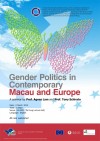

Macao (also spelled Macau; 澳門) is a Special Administrative Region (SAR) of the People’s Republic of China since 1999, which had become a Portuguese colony when the first settlers arrived in the 1550’s. Thus, Macao has a very strong European heritage which has perfectly fused with its Chinese origins. This distinctive blend of cultures manifests itself in the city’s architecture, art, religion, traditions, food, and in its people. Furthermore, in 2005, Macao was inscribed on the UNESCO World Heritage List for its unique historical and cultural landscape.
Macao lies on the western bank of the Pearl River Delta, in southern Guangdon province, bordered by the Mainland city of Zhuhai, and 64 kilometers west of its sister city, Hong Kong. Macau is made of Macau Peninsula, and the two islands of Taipa and Coloane. Its peninsula is the hub of the territory and is connected to Taipa island by three road bridges. Several large international hotel resorts are located on the reclaimed land between Taipa and Coloane in the newly developed district known as Cotai.
Although Macau became a Special Administrative Region of the People’s Republic of China on 20th December 1999, it still maintains a high level of autonomy, under the policy of “one country, two systems”. While the PRC’s Central People’s Government is responsible for the territory’s defense and foreign affairs, Macau maintains its own legal system, police force, monetary system, customs police, and immigration policy. This semi-independence is guaranteed by the Sino-Portuguese Joint Declaration and the Basic Law of Macao, until at least 2049.
The Rule of Law in Macao is exercise through separate executive, legislative and judicial power. The Government of Macao is headed by the Chief Executive (currently Fernando Chui Sai On), who is appointed by the Central Government of the PRC upon the recommendation of an election committee, whose 300 members are nominated by corporate and community bodies. The Legislative Assembly is the legislative body of Macao, formed by 33 members of whom 14 are directly elected, 12 are indirectly elected by functional constituencies, and 7 are appointed by the chief executive. Any permanent resident above the age of 18 are eligible to vote for the 14 directly elected members of the assembly. As for the legal system, Macau has a three-tier court system: the Court of the First Instance, the Court of the Second Instance and the Court of Final Appeal, which is based on the Portuguese civil law system as maintained after the 1999 devolution to China. Macao has its own independent judicial system with a High Court. Judges are selected by committee and appointed by the chief executive. Foreign judges may still serve in courts of Macao.
EU DEFENSE AND SECURITY: CHALLENGES AND RESPONSES

In a time of numerous global threats such as terrorism, armed conflicts or uncontrolled mass migrations, how to protect
MACAU MODEL EUROPEAN UNION 2017

If you are a full-time student in any higher education institutions of Macau, sign up to take part in this 2-day
EUAP-M MARKS INTERNATIONAL WOMEN’S DAY WITH A TALK ON GENDER POLITICS

To celebrate the International Women’s Day, the European Union Academic Programme in Macao (EUAP-M) organizes on 4
CALL FOR APPLICATION FOR FELLOWSHIP PROGRAMME FOR VISITING SCHOLARS OF EUROPEAN UNION STUDIES AT THE UNIVERSITY OF MACAU IN ACADEMIC YEAR 2015 – 2016

The European Union Academic Programme in Macao (EUAP-Macao) invites applications for the fellowship programme for
CALL FOR APPLICATION FOR FELLOWSHIPS FOR ENHANCEMENT OF TEACHING AND RESEARCH ON THE EU STUDIES IN ACADEMIC YEAR 2015 - 2016:

The European Union Academic Programme in Macao (EUAP-Macao) invites applications for the fellowship programme for
MACAU MODEL EUROPEAN UNION 2016: CALL FOR APPLICATIONS

The Model European Union is back to the University of Macau! If you are a full-time student in any of the higher